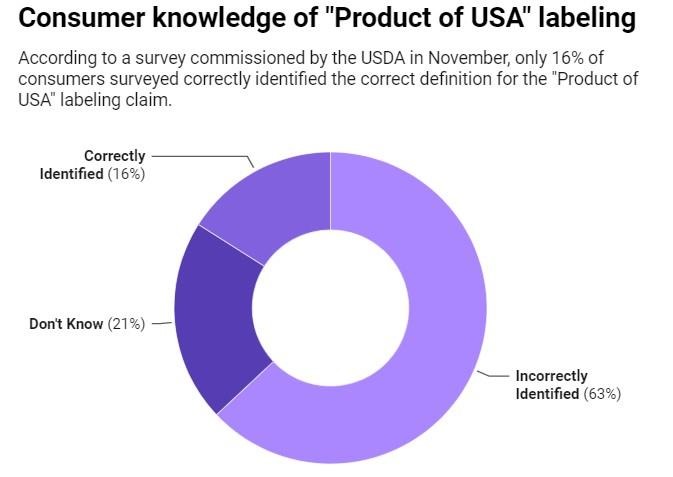By Xcaret Nuñez
Grocery shoppers could soon find fewer rib-eye steaks or chicken breasts with a “Made in the USA” label on the package if a new rule proposed by the Biden administration goes into effect.
The U.S. Department of Agriculture recently announced a proposed rule that would allow voluntary labels on meat, poultry and eggs that claim “Made in USA” or “Product of USA” — but only when it comes from animals that are born, raised, slaughtered and processed in the U.S.
The current rule allows those products to be voluntarily labeled “Product of USA,” even if the animal was raised and imported from another country or if meat products were imported and repackaged in the U.S.
“American consumers expect that when they buy a meat product at the grocery store, the claims they see on the label mean what they say,” said Agriculture Secretary Tom Vilsack in a release about the proposed rule.
The Biden administration and the USDA proposed reviewing the country of origin label claims for meat early last year as a way to encourage competition in the highly consolidated meat sector and the overall economy.
A survey commissioned by the USDA in November found nearly two-thirds of consumers believed that a “Product of USA” label meant all steps of meat production must happen in the U.S.

The label proposal is open for public comment until May 12.
Four beef processing companies — which include Tyson Foods, JBS, Cargill and Marfrig — control about 85% of the meat market. American farmers and ranchers often argue they’re being undercut by foreign beef imported by these companies and labeled as a “Product of USA.”
“These Big Four packers shouldn't be able to use our good name as farmers and ranchers of the United States and bring in an inferior product and then repackage it and put our name on it,” said Justin Tupper, president of the United States Cattlemen’s Association.
The USCA is one of three organizations that petitioned the USDA to propose new requirements for labeling claims on beef products. While the organization is pleased with the recently proposed rule, Tupper said they’d ultimately like to see mandatory country-of-origin labeling.
“We're not saying (consumers) can't buy from another country, we're saying that (consumers) should know what they're buying, and they should have that choice to buy a product that was born, raised and slaughtered here in the United States,” he said.
Consumer organizations such as the Consumer Federation of America also welcomed the proposed rule. Thomas Gremillion, the food policy director for the consumer organization, said the current rule misleads consumers and hurts American producers.
“Some consumers are willing to pay more for a product that's labeled ‘Product of the USA,’ and that claim should be meaningful,” he said. “And under the current rules, it is not.”
A long debate
The back and forth over U.S. meat labeling has been going on for years.
The USDA finalized mandatory country-of-origin labeling standards for meat in 2009, but the World Trade Organization authorized Canada and Mexico to impose over $1 billion in tariffs against the U.S. unless the mandatory labeling requirements were removed for beef and pork. Congress ultimately repealed the labeling requirements in late 2015, and Agriculture Secretary Vilsack stopped the enforcement of them.
The North American Meat Institute, which represents some of the largest meat processing companies with sales in the U.S., opposes the proposed rule and warns it could trigger similar international trade retaliation despite voluntary labeling. The institute also claims it will burden the USDA’s Food Safety and Inspection Services.
“Our members make considerable investments to produce beef, pork, lamb, veal and poultry products in American facilities, employing hundreds of thousands of workers in the U.S. and with processes overseen by USDA inspectors,” said NAMI President and CEO Julie Anna Potts in a release. “This food should be allowed to be labeled a ‘Product of the USA.’”
Ultimately, the labels may have little impact on what consumers buy.
A 2015 economic review of country-of-origin requirements conducted by the USDA found that mandatory labeling for U.S. products increased production, processing and marketing costs and did not increase consumer demand for meat products. As a result, the report found, it led to economic losses to producers, packers, retailers and consumers. But the USDA suggested voluntary labeling would allow the market to decide if the label is worth including for certain products.
If meat products, such as roast, don't sell better with a U.S.A. label then companies can choose to leave it off, said Glynn Tonsor, an agriculture economics professor at Kansas State University, who also co-authored the 2015 report. "Conversely, say for rib-eye steaks, if people see value in that, you might see that label more on rib-eye steaks."
But the country of origin label on meat products is often the second-lowest ranking factor the average grocery shopper looks for, said Tonsor, who also runs the Meat Demand Monitor, a monthly report that tracks U.S. consumer demand for meat.
“There are individual consumer segments that put a high priority on (country of origin) information,” he said, “and those are what I call niche market, voluntary market opportunities. But taste, price and freshness are regularly the top three considerations.”
The proposed rule is the latest effort to establish either mandatory, voluntary or prohibited country-of-origin labeling for meat products.
Earlier this year, U.S. Senators John Thune, R-S.D.; Jon Tester, D-Mont.; Mike Rounds, R-S.D.; and Cory Booker, D-N.J., reintroduced the American Beef Labeling Act in an effort to reinstate mandatory country-of-origin labeling for beef.
“I don't think the topic of origin labeling is ever going to go away,” Tonsor said. “... I fully expect to have discussions like this until I'm retired and somebody else can talk about it more after I'm retired.”
Click here to see more...